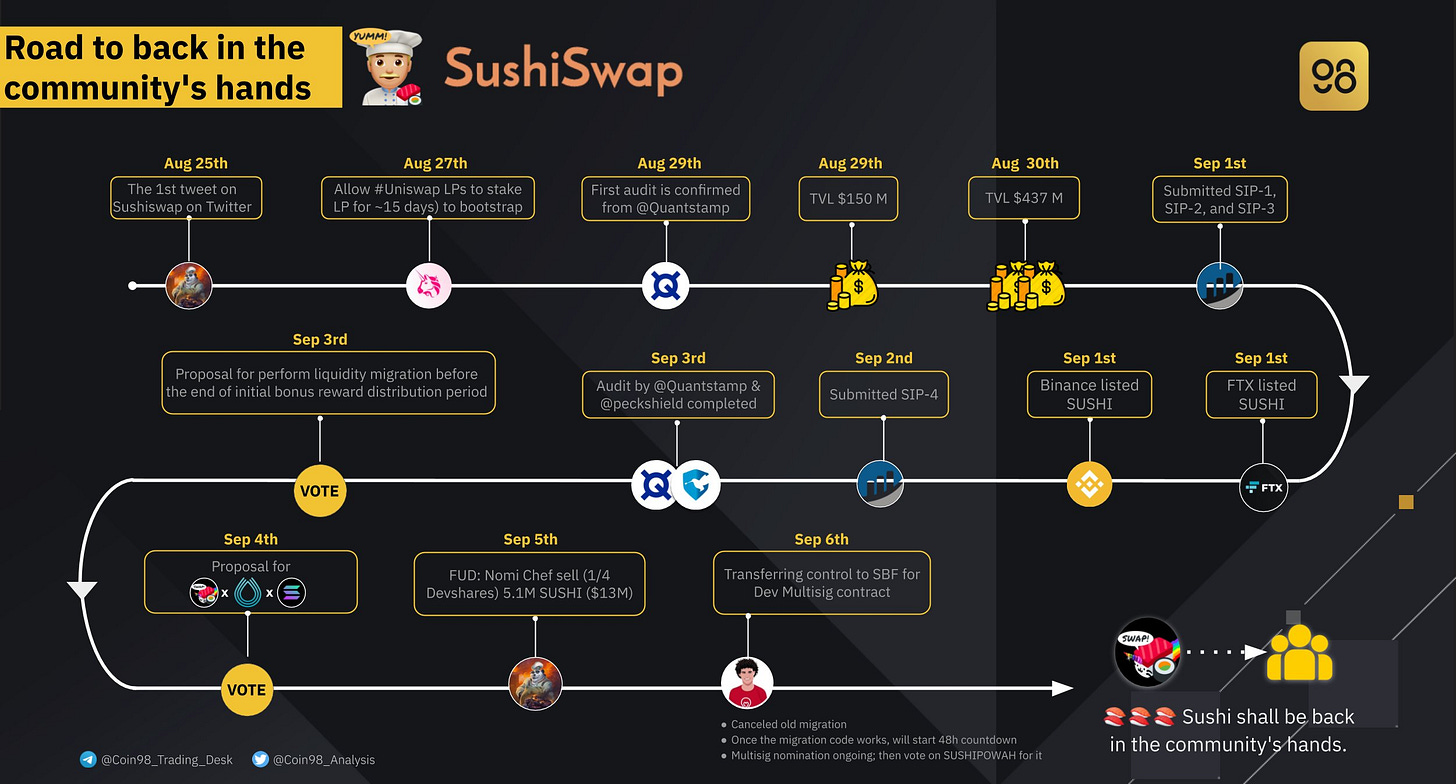Long Take: How signalling explains SoftBank's $4 billion call option trade, SushiSwap's vampire attack, and why we make Art
Hi Fintech futurists --
This week, we look at:
PayPal and Square being larger than Bank of America and Goldman Sachs
The SoftBank $4 billion in tech oligopoly call options, and why people feel uneasy
Uniswap vs. SushiSwap, and Bitcoin vs. Litecoin, and why these forks felt wrong
How understanding signalling can help make better decisions
For more analysis parsing 12 frontier technology developments every week, a podcast conversation on operating fintechs, and novel food-for-thought essays, become a Blueprint member below.
Long Take
It's Labor Day. Maybe you are enjoying a quarantined barbecue.
We've been reading The Case against Education: Why the Education System Is a Waste of Time and Money. The core premise is that, at least in the American education system, the value of getting a degree is one part skill gathering and another part labor market signalling. The controversial point made by the author is that 80% of our schooling -- from high school, to college, to graduate degrees -- is signalling. It is largely a competition to demonstrate intelligence, conformity to social expectations, and diligence. As a corollary, it is therefore *not* a competition to acquire useful skills to be applied in future work.
As someone who acquired a JD/MBA degree and then started a company, I would agree that the JD/MBA is primarily expensive signalling when compared to the lived experience of grinding away at a business. The education asset is in large part performative relative to the performative accomplishments of others (which I am now shamelessly signalling to you as a credential!). It is the attainment of an art.
In evolutionary theory, there are good explanations for art. It happens that humans are not the only creatures that sing, perform elaborate dances, and pusue the aesthetic. Other animals do this too -- and the ones that outperform relative to their peers often do these seemingly useless activities to extreme perfection. The pursuit of obtuse and non-useful activity, such as collecting all blue things you've ever seen into a large pile, is a mating signal.


The larger your pile, the more concrete the inference that you are so endowed in resource and high quality DNA that wasting time on your pile is something you can afford to do. Because you are so strong and healthy, you can spend the time in aesthetic pursuit. Pretty good for birds! This evolutionary logic is not a formed rational thought in our brains, but a thread woven into our biology and spinal column. When Hieronymus Bosch spends years creating a painting in the 1400s, it is not a growth strategy to gain followers on Instagram, but an intuitive pursuit of mastery and social standing within the social context, often on the behalf of a patron that has money to burn (e.g., a monarch, a Church). It is a signal.
The super-organisms that instantiate as our cultures and societies do this too -- signalling is not just for individual actors. Take the Sagrada Familia, started in the late 1800s and still under construction. We make the beautiful thing because we can, to signal the superiority of our spirit.

Our nations strive to make the tallest buildings to create a signal that looks like a derivative of national progress. Industry powers economy, which requires the organization and packaging of individual labor into a lightning rod for collected brainpower. And when we don't have real progress to show, such as in purely resource-extractive economies, we make the tallest building anyway to cover up for the lack of some fundamental economic motion.

The Financial Devil
Humans are clever. Our brains are large not to escape the tiger, but to compete with each other. Signalling is constantly arbitraged.
And in finance, we need to develop a framework for identifying signalling, and apply caution the moment we see it.
For example, let's consider this compelling article: Disruptors PayPal and Square surpass Wall Street giants including Goldman Sachs in market cap. One signal is location -- PayPal and Square are "disruptors" from "Silicon Valley". Young companies all over the world spent decades trying physically to get to the Valley to signal their growth potential to venture investors, who then select winners meanwhile signalling the quality of the company with the "prestige" of the investor brand. Would you rather Andreessen Horowitz was on your board, or an angel investor from some unglamorous business background? Even today, when decentralized finance is culturally reacting against tech monopolies, it is looking for the great signal of raising venture financing.

The other signal which we see plainly is the market itself -- and this financial measure of marketcap. What does it mean to have a market capitalization? Why is it important whether the market capitalization is high or low? At the basic level, it is the number of shares times the number of share price. The share price is cleared based on the supply and demand for owning the share of some particular company. But immediately we run into a multitude of weird 21st century observations.
The market capitalization is not the enterprise value, just the equity value. Companies could be levered with debt, which can be related to the operations of the firm, or the activities of the customer. OnDeck and Kabbage could have any market capitalization they wanted, but the collapse of the small business market in the black swan event of COVID economy shut-down was more meaningful existentially. Alternately, private equity firms have evolved to be financial organisms that exchange debt for corporate restructuring and value extraction across various company types. One should certainly argue that share price captures leverage, but I doubt this is true for the retail investor trading based on memes (i.e., Elon Musk is Iron Man).

Share prices theoretically derive from growth and profits, but we are in a macro environment where interest rates are synthetic and irrelevant, growth is (was?) endlessly prioritized, and institutional investors have no alpha but for alternative assets. Trading around equities happens in large part around the rebalancing of multi-trillion BlackRock and Vanguard ETF portfolios, which are facilitated by obscure market-makers paying Robinhood for orderflow in which to splash around operations. As an individual, it is hard to deduce anything of particular value from today's market valuation. Or rather, an individual would be well advised not to be confident in deducing anything in particular.
As another example, one might feel smart about selecting Apple, Google, Facebook, Tesla, or Microsoft as recent investments. The tech companies are on top of the world! Their current cone of probability is to engulf not just all media, but all financial products through the embedded finance narrative coming from Silicon Valley. We can add Amazon to the list of companies fighting over fintech in India, on top of WhatsApp and the rest.

And yet, the recent market run-up in tech stocks could have been caused by a massive options-buying strategy by tech mega-corp SoftBank. You might remember SoftBank as the funder of WeWork, Uber, Revolut, SoFi, and Ant Financial, among many other moon shots. As SoftBank took a beating on its over-priced venture bets, it developed a public equities strategy of taking highly levered options bets on the large tech companies.
We would hypothesize that a realization like the following could drive that investment bet: no matter how much capital you put into blitzscaling, the high tech incumbents have far better returns to scale and are much better positioned to take share from financial services than new brands. They also have better data, talent, and revenue bases.
And so Softbank spent $4 billion to buy call options on the world's largest companies. Look, the Vision fund was about $100 billion. That's a big fund. But $4 billion on call options is a massive amount as well, because it naturally levers up the exposure. You are not betting on the share price, just the growth in the share price. A rise of 10% can become 100% easily. This investment strategy was not made explicit to the market, and was uncovered just last week -- tagging SoftBank as the NASDAQ whale that has been moving the options markets.

Despite making multiple billion in unrealized capital gains from the trade, SoftBank inadvertently sent the wrong signal. The tech company prices weren't going up because they were "good", but because SoftBank was levering up gigantic positions that were moving the price arithmetically by impacting the supply and demand of shares (i.e., a gamma squeeze). And so you, as a retail investor holding the tech company stocks, were a mere free-rider on the waves from this financial exchange.
Further, the idea of SoftBank as a financial speculator rather than a wizard-like oracle investor in the future of technology corrupts our mental models. If SoftBank thinks speculation is better than financing innovation, what are we left to think about the prospects of innovation?
Nothing But Memes
Signalling is even more of an issue in the crypto markets, which has limited operating connectivity to the blood and flesh of the "real world". So, for example, in obsessing about Total Value Locked in Defi, we may be obsessing over a gamed metric that can actually signal risk instead of progress.
A leading decentralized exchange, Uniswap, was recently attacked by having its open source code copied, rewarding users of the copied protocol with native tokens, pulling liquidity out of Uniswap into the new protocol, and then planning to make the transfer permanent. If you looked at the metrics, it looked like Uniswap had more trading volume than Coinbase! If you looked at the underlying, it was a bleed out of capital from one venue to another -- the convulsions of the animal during a vampire attack.
The new protocol SushiSwap signalled that it wanted to give rewards to users, its liquidity providers. It wanted to build a better version of the community project. The founder said all the right things to get people to trust a personally controlled fork of a technology. And over the weekend, that founder cashed out over $10 million in reward token allocation for himself before being expelled from the project. The code base was "rescued" by Sam Bankman-Fried, who runs Alameda Research and FTX, a derivatives exchange. FTX wants to stand up not just a Uniswap competitor, but an Ethereum competitor called Solana. To do this, it has also recently acquired Blockfolio and its 6 million users for a reported $150 million. This is not a clean story of Total Value Locked going up = DeFi is winning.


We can think back to Charlie Lee, the founder of Litecoin selling all of his Litecoin assets at the top of the 2017 ICO market, for what likely approached USD billions. Litecoin is a fork of Bitcoin with some properties that make it a cheaper alternative, or a testnet for the actual Bitcoin network. It is not unlike SushiSwap relative to Uniswap. Charlie himself is an engineer, had helped build Coinbase, and has nearly a million of Twitter followers. Those are strong, positive signals. What has it meant for Litecoin investors over the last 2 years? Not much. LTC is down 85% since Charlie sold his position.

We of course have to measure things. There need to be ways to understand value and market capitalization and success. But we also need to pay careful attention to whether the squiggly line we track on performance charts captures something that one should care about, or is just a proxy for exclusivity and social standing. And when metrics change quickly, as in the market shifts in Fintech or Crypto, we have to pay attention to whether the new metrics are signals of the type that we are used to in the old world, or are more nebulous and subject to gaming.
Resolution
Where to land this mess? If humans spend most of their time on signal and so little time on the "real thing", whatever that may be, are we doomed to a world of pretend?
In regards to our apprehension about data produced by an abnormal stock market, some would point to Benjamin Graham and the comment that in the short run the market is a "voting machine" of popular and unpopular firms, and in the long run is a "weighting machine" of actual economic performance.

Studies do show this to be a testable, and likely accurate claim. Still, there is something of a zombie dynamic going on right now. The capital markets are not some Platonic ideal that exists untethered from culture and geopolitics. The capital markets are a feature of a self-perpetuating macro structure.
Like the human animal with its interest in art in order to signal fitness, we can imagine the capital markets creating numbers that appear to signal a healthy economy while actually being completely uncoupled from one. High stock prices and legendary trading volume do not mean you live in a happy and healthy country, just in one where some numbers (including inequality) go up.


There is no clear answer. The truth does not always win. We can live in hallucination all our lives, waiting for the tide to turn.
The most we can do is ask questions, and pay attention to the answers. In particular, pay attention to which data you incorporate into your mental model of the world, and which data you identify as an overinvestment into noise by your competitors. Ask yourself about the game theoretical equilibrium of whatever game you are competing in. Modulate how much you need to signal, and what that signal has to say, based on how much others do it. Remember finally that even the games are part of meta-games, and may not have your health and happiness at heart. Sometimes the right move is to understand that some particular rat race is the wrong one for you, and leave it to the other rodents.

For more analysis parsing 12 frontier technology developments every week, a podcast conversation on operating fintechs, and novel food-for-thought essays, become a Blueprint member below.
